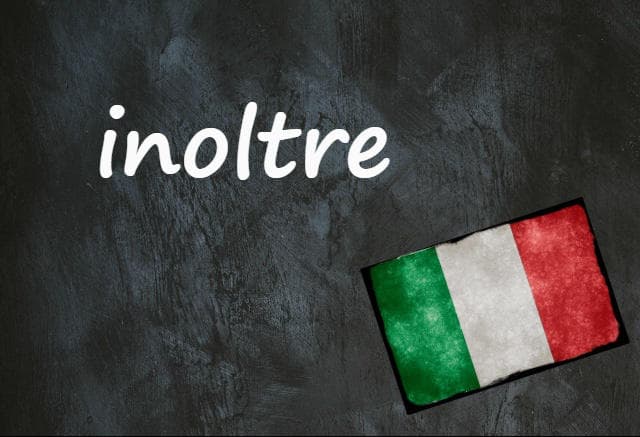
Italian word of the day: 'Inoltre'

This is a helpful word to know. Besides, it's really easy to use.
You could be forgiven for thinking that this word, which looks like in + oltre ("in" and "other") could mean "otherwise", "on the other hand", or something similar.
It doesn't. It actually means "besides" or "moreover".
You use it when you want to give another reason for something, and it's really good for making clever points in all those Italian arguments you'll soon be taking part in.
For example:
- Inoltre, il cibo era freddo quando è arrivato.
- Besides, the food was cold when it arrived.
- È brutto e inoltre cattivo.
- He’s ugly and mean, too.
- Inoltre, non ha chiesto scusa!
- What's more, she hasn't apologised!
But you'll hear this word used in all kinds of situations, including formal ones.
In English, we might never use the words "furthermore" and "moreover" outside of essay writing, but inoltre can be used to mean both.
Listen out for it during your next brush with Italian bureaucracy, and you probably won't be disappointed.
- Occorre, inoltre, la fotocopia della carta d’identità.
- Moreover, a photocopy of your ID card is needed.
- Inoltre, è necessario soddisfare requisiti specifici.
- Furthermore, you must meet specific requirements.
- Puoi pagare le bollette online. Inoltre, è possibile controllare il saldo.
You can pay bills online. Additionally, you can check your balance.
We think this word is a pretty good one to know. Besides, it's not difficult to say: in-ol-treh, with the stress on the second syllable.
And what's more, inoltre is a handy little "bridge" word; a word that can fill in gaps in sentences, buy you a few seconds of thinking time, and help you sound a little bit more fluent (if used properly, of course!)
We think these little words are extremely useful.
Do you have a favourite Italian word you'd like us to feature? If so, please email us with your suggestion.
Comments
See Also
You could be forgiven for thinking that this word, which looks like in + oltre ("in" and "other") could mean "otherwise", "on the other hand", or something similar.
It doesn't. It actually means "besides" or "moreover".
You use it when you want to give another reason for something, and it's really good for making clever points in all those Italian arguments you'll soon be taking part in.
For example:
- Inoltre, il cibo era freddo quando è arrivato.
- Besides, the food was cold when it arrived.
- È brutto e inoltre cattivo.
- He’s ugly and mean, too.
- Inoltre, non ha chiesto scusa!
- What's more, she hasn't apologised!
But you'll hear this word used in all kinds of situations, including formal ones.
In English, we might never use the words "furthermore" and "moreover" outside of essay writing, but inoltre can be used to mean both.
Listen out for it during your next brush with Italian bureaucracy, and you probably won't be disappointed.
- Occorre, inoltre, la fotocopia della carta d’identità.
- Moreover, a photocopy of your ID card is needed.
- Inoltre, è necessario soddisfare requisiti specifici.
- Furthermore, you must meet specific requirements.
- Puoi pagare le bollette online. Inoltre, è possibile controllare il saldo.
You can pay bills online. Additionally, you can check your balance.
We think this word is a pretty good one to know. Besides, it's not difficult to say: in-ol-treh, with the stress on the second syllable.
And what's more, inoltre is a handy little "bridge" word; a word that can fill in gaps in sentences, buy you a few seconds of thinking time, and help you sound a little bit more fluent (if used properly, of course!)
We think these little words are extremely useful.
Do you have a favourite Italian word you'd like us to feature? If so, please email us with your suggestion.
Join the conversation in our comments section below. Share your own views and experience and if you have a question or suggestion for our journalists then email us at [email protected].
Please keep comments civil, constructive and on topic – and make sure to read our terms of use before getting involved.
Please log in here to leave a comment.